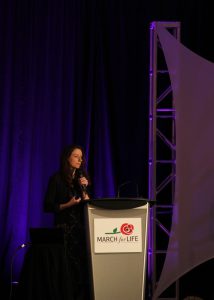Gray stressed the need to validate the difficult experiences of some pregnant women while advocating for the rights of “the pre-born child.” Circumstances of poverty, age and rape may mean that a pregnancy is particularly difficult, Gray said, but it is important to compare the life of the fetus to that of a born child.
“Would it OK for anyone to kill the born child for reasons of poverty?” she asked. “We need to use our powers of persuasion to try to move the hearts and minds of that woman and anyone else in that moment of crisis so that abortion is unthinkable.”
Following Gray’s speech, Moira Gaul, an associate scholar at the Charlotte Lozier Institute, an anti-abortion think tank, said pregnancy help centers served more than 2 million people in 2010 with an estimated community cost savings of more than $100 million. Nearly 249,000 ultrasounds were performed in 2016, she noted, and many sites offer reproductive care beyond pregnancy such as testing and treatment for sexually transmitted diseases. Tim Saccoccia, policy coordinator for Knights of Columbus, added that the Catholic organization launched an ultrasound fundraising initiative of its own in 2009 and has since placed over 900 machines in pregnancy health centers nationwide. Knights of Columbus will place its first ultrasound machine in D.C. in June, he said.
Despite their work, Gaul said, pregnancy health centers are under attack, citing the upcoming Supreme Court case in which a California law mandating that faith-based crisis pregnancy centers disclose information on the accessibility of state abortion resources is being challenged as a violation of the First Amendment right to free speech. Abortion rights advocacy group NARAL has alleged that these kinds of sites knowingly provide medical misinformation to “scare or shame women out of choosing abortion.”
Upcoming legislative battles for anti-abortion advocates also include the consideration of the Born-Alive Abortion Survivors Protection Act, which was introduced in the House in early January and the Pain-Capable Unborn Child Protection Act passed by the House in October.
Past presidents including Ronald Reagan and George W. Bush have addressed the march by telephone, but President Donald Trump will be the first president to address the crowd live from the White House via satellite on Friday. In advance of Trump’s remarks, NARAL released a report highlighting anti-abortion activists’ influence in the Trump administration.
“In 2016, the anti-choice movement’s top leaders … decided to throw their support behind the then-Republican nominee, Donald Trump,” NARAL President Ilyse Hogue wrote in the report. “They leveraged their influence to extract extensive promises, legitimize his candidacy, and bolster his turnout. Trump has followed through on his commitments.”
The 45th annual March for Life will occur on Friday.




